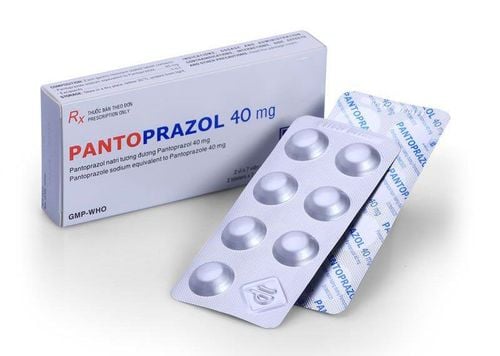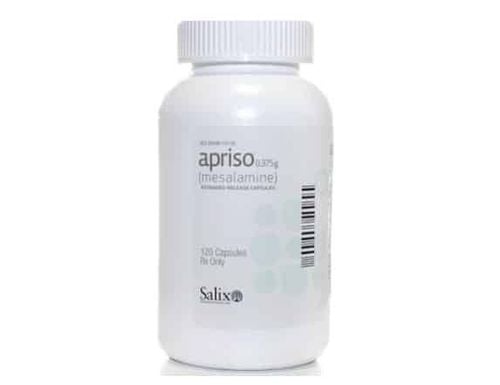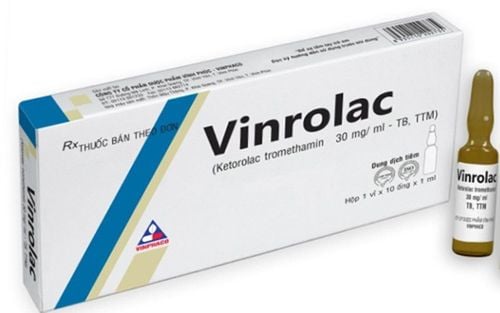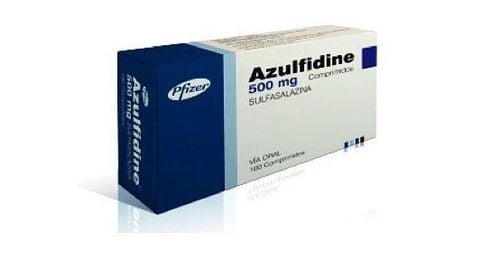This is an automatically translated article.
Asacol is available in the form of a slow-release tablet, with the main ingredient being mesalamine. The drug is used in the treatment of ulcerative colitis.
1. Uses of Asacol
What is Asacol? Asacol contains mesalamine as the main ingredient. This ingredient reduces inflammation by blocking cyclooxygenase and inhibiting prostaglandin production in the colon.
Indications for the use of Asacol:
Treatment of mild to moderate ulcerative colitis in patients 5 years of age and older; Maintenance of remission of ulcerative colitis in adults with mild to moderate disease. Contraindications to the use of Asacol:
Patients with known or suspected hypersensitivity to salicylate/aminosalicylate or other components of the drug.
2. How to use and dose Asacol
2.1 How to take the drug Some notes when taking Asacol include:
2 Asacol 400mg tablets cannot be replaced or can be replaced with 1 800mg slow-release mesalamine tablet; The patient's renal function should be assessed before starting Asacol; It is okay to take Asacol with or without food. Asacol tablets should be swallowed whole, not broken or chewed; It is possible that part or all of the Asacol tablet is excreted with the stool. If this condition occurs more than once, the patient should contact the doctor; Store Asacol in a cool, dry environment, away from moisture (put in a bottle with a desiccant bag). 2.2 Dosage Dosage for treatment of mild to moderate ulcerative colitis:
Adults: The recommended dose is 2 tablets of 400mg x 3 times/day (total daily dose is 2.4g) for 6 weeks; Children: For pediatric patients 5 years of age and older, the total recommended daily dose of Asacol is based on weight (maximum 2.4 g/day). Specific dosage is as follows: 11 - 33kg: Use 36 - 71mg/kg/day, the maximum dose is 1.2g/day, take 2 tablets in the morning + 1 tablet in the afternoon; 22 - 54kg: Use 37 - 61mg/kg/day, the maximum dose is 2g/day, take 3 tablets in the morning + 2 tablets in the afternoon; 54 - 90kg: Use 27 - 44mg/kg/day, maximum dose is 2.4g/day, take 3 tablets in the morning + 3 tablets in the afternoon. Dosage for maintenance of mild to moderate ulcerative colitis: Adults: The recommended dose is 4 tablets of 400g/day (1.6g/day), divided into 2-4 doses.
Dosage for other subjects:
Pregnant women: Not much is known about the use of Asacol in pregnant women. Care should be taken when using the drug in pregnant women, only use if prescribed by a doctor; Nursing mothers: Consult your doctor before taking Asacol; Elderly: Consider caution when prescribing Asacol to people over 65 years of age; Patients with renal impairment: The mesalamine component of Asacol is significantly excreted by the kidneys and may cause many adverse reactions in patients with impaired renal function. Therefore, renal function in the user should be assessed before prescribing Asacol. At the same time, patients with renal impairment or a history of renal disease, taking nephrotoxic drugs, and mesalamine-related adverse reactions should be monitored. Overdose: Mesalamine overdose has no specific antidote. When acute poisoning Asacol, patients are treated symptomatically and supportively. This includes preventing further absorption in the gastrointestinal tract, correcting electrolyte imbalances, and maintaining kidney function.
3. Asacol side effects
When using Asacol, patients may experience some side effects such as:
Body as a whole: Edema, facial edema, neck pain, drug fever, lupus-like syndrome; Cardiovascular: Myocarditis, pericarditis; Digestive: Anorexia, increased appetite, gastritis, pancreatitis, cholecystitis, mouth ulcers, dry mouth, peptic ulcers, bloody diarrhea; Hematology: Thrombocytopenia, eosinophilia, aplastic anemia, agranulocytosis, leukopenia, anemia, lymphadenopathy; Musculoskeletal: Gout; Neurological: Drowsiness, depression, delirium, emotional instability, confusion, dizziness, tremor, peripheral neuropathy, Guillain-Barre syndrome, transverse myelitis; Kidney: Renal failure, interstitial nephritis; Respiratory/pulmonary: Interstitial pneumonia, exacerbation of asthma, eosinophilic pneumonia, pleurisy; Skin: Psoriasis, pyoderma, dry skin, alopecia, urticaria, erythema nodosum; Senses: Eye pain, blurred vision, taste disturbance, tinnitus; Urology - genitourinary: Urination, dysuria, hematuria, menorrhagia, epididymitis, reversible oligospermia; Laboratory tests: Increase in AST or ALT, increase in alkaline phosphatase, increase in GGT, increase in LDH, increase in bilirubin, increase in blood creatinine and BUN.
4. Be careful when using Asacol
Before and while using Asacol, patients should note:
Risk of kidney failure, acute and chronic interstitial nephritis may occur in patients using Asacol. The patient's renal function should be assessed before starting Asacol and periodically during treatment. The mesalamine component may be associated with acute intolerance syndrome. Symptoms include abdominal pain, cramping, bloody diarrhea, sometimes with fever, headache, and rash. Should monitor for worsening symptoms during treatment, if this syndrome is suspected, immediately stop Asacol; When using Asacol, patients may experience hypersensitivity reactions related to internal organs such as pericarditis, myocarditis, hepatitis, nephritis, pleurisy and hematological abnormalities. Patients should be evaluated immediately if symptoms of hypersensitivity are present. Asacol should be discontinued if the cause of the above symptoms cannot be determined; There have been cases of liver failure with Asacol in patients with pre-existing liver disease. The risks and benefits of use in patients with hepatic impairment should be assessed before taking Asacol.
5. Asacol drug interactions
Some drug interactions of Asacol include:
Concomitant use of Asacol with nephrotoxic agents (including non-steroidal anti-inflammatory drugs) may increase the risk of nephrotoxicity. Patients receiving nephrotoxic drugs should be monitored for changes in renal function and drug-related adverse reactions; Concomitant use of Asacol with azathioprine or 6-mercaptopurine may increase the risk of blood disorders. If the concomitant use of the above drugs cannot be avoided, regular monitoring of blood tests, including a complete blood count and platelet count, is recommended. When using Asacol, patients should follow the doctor's instructions to ensure the effective treatment of the disease. At the same time, patients need to follow a good diet for the digestive system, avoid stress and periodically check their health for timely intervention.
Follow Vinmec International General Hospital website to get more health, nutrition and beauty information to protect the health of yourself and your loved ones in your family.
Please dial HOTLINE for more information or register for an appointment HERE. Download MyVinmec app to make appointments faster and to manage your bookings easily.













